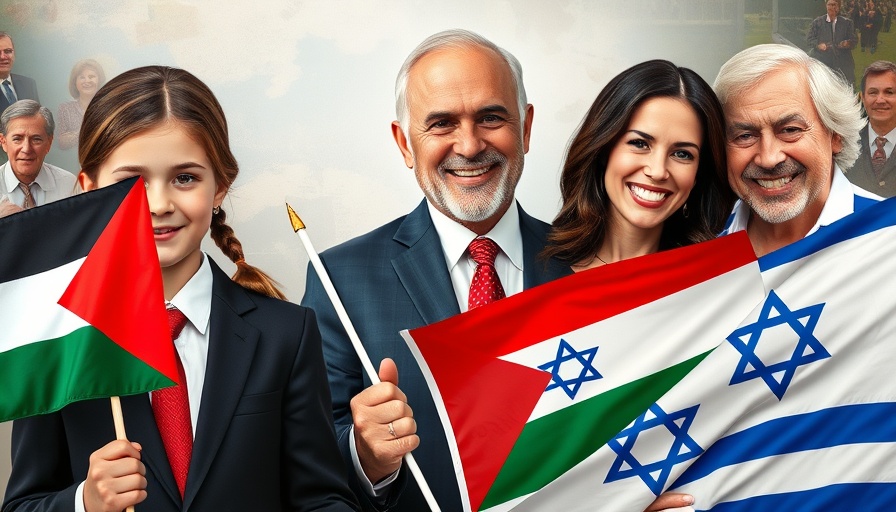
The Fragile Path to Peace: Analyzing Trump's Role in the Israel-Gaza Ceasefire
In the wake of intense negotiations that led to a potential ceasefire between Israel and Hamas, President Donald Trump's involvement has raised eyebrows and sparked hope among various stakeholders involved. The ceasefire is seen not merely as a temporary truce but as a pivotal moment that could pave the way for a more durable peace agreement. Trump's recent pronouncements claim that a 'peace agreement' is on the horizon, but what does this really mean for those residing on both sides of the conflict?
In 'Can US President Trump turn Israel-Gaza ceasefire into lasting peace deal?', the discussion dives into recent developments in the Israel-Gaza conflict and the broader implications for international relations.
Understanding the Ceasefire Agreement
Reports indicate that a ceasefire appears imminent following significant compromises from both parties. The framework includes the release of Israeli hostages in exchange for Palestinian prisoners held in Israel. Additionally, the deal facilitates an influx of humanitarian aid into Gaza—a pressing need considering the humanitarian crisis unfolding in the region.
The sentiment in Israel has shifted considerably, reflecting a growing support among its people for ending military operations and prioritizing the safe return of hostages. As hostages are celebrated upon their expected return, public confidence in the government's ability to secure a favorable outcome has been bolstered. Simultaneously, emotions in Gaza reflect relief that the bombardments may stop, allowing civilians a chance to rebuild their lives amidst the ruins.
What Remains Uncertain?
Despite the optimism surrounding the ceasefire, several crucial aspects remain unresolved. For instance, Hamas's potential disarmament remains a sensitive issue, alongside the question of governance in Gaza post-conflict. Moreover, Israel's commitment to withdrawing completely from the coastal enclave has yet to be clarified, leading many skeptics to question whether this fragile momentum will last. Not to mention, the specter of historical failures in peace negotiations looms large, with the timeline for future developments remaining uncertain.
The International Community's Role
A considerable amount of international pressure has converged on the negotiations, making the stakes much higher this time around. President Trump's direct involvement has been touted as a decisive factor, with his allies in the region, including Qatar and Egypt, playing significant roles. The influx of humanitarian aid into Gaza is another dimension of the pressure brought to bear on both parties, highlighting the global community's vested interest in a sustainable solution.
The international backdrop cannot be overlooked; the recent history of ceasefire agreements that dissolved into further violence casts a shadow over the current negotiations. However, amidst the distressing context, the arrival of aid is a crucial step that underscores the humanitarian dimension of these talks. Observers should remain vigilant about how external influences could affect the efficacy of the ceasefire and its longer-term implications.
Implications for Diplomacy and Future Strategies
The outcome of this ceasefire is a reflection of the complex choreography involved in Middle Eastern diplomacy. With Trump's administration under scrutiny for how it navigates this intricate landscape, the focus will inevitably turn to the next steps. Will the momentum continue, or will the conflicting interests of hardliners on both sides derail the fragile peace?
The ultimate test will be the ability of the involved parties to engage in sincere dialogue that addresses the core issues at play. This involves not just the immediate goal of establishing a ceasefire but building trust over time—a challenge that has historically tripped up even the most well-intentioned peace efforts.
Conclusion: A Moment of Hope or Just Another False Dawn?
In conclusion, while both sides express cautious optimism regarding the ceasefire and broader peace talks, it’s essential to recognize that lasting agreements require steadfast commitment, transparency, and international support. Only time will tell if this moment represents a pivotal turning point in the Israel-Gaza conflict or if it will simply be heralded as yet another missed opportunity for peace.
As developments unfold, we encourage readers to stay informed and engaged with ongoing discussions surrounding this critical issue, fostering an understanding that extends beyond borders and impacts millions around the globe.
 Add Row
Add Row  Add
Add 




Write A Comment